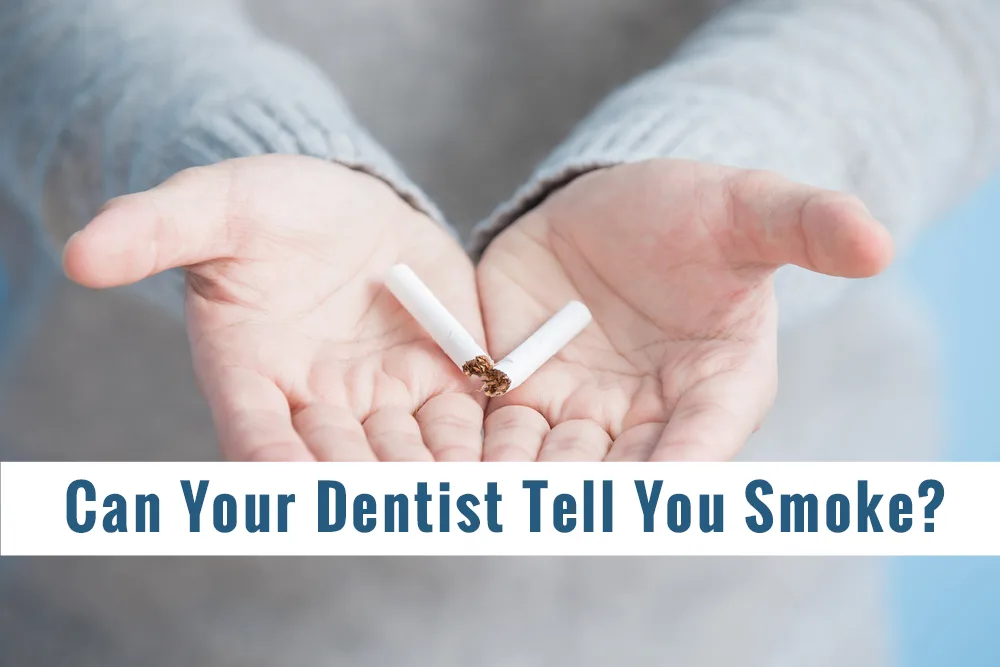
When preparing to go in for a dental cleaning appointment, sometimes people worry that their dentists will see signs of dental issues and judge them. However, that is far from what your dentist is there to do!
Smokers, in particular, can become concerned that their dentists can tell that they smoke on their teeth. While there are obvious signs that dentists will see—such as stains on the teeth and gum recession—our dentists here at Riverside Dental Care aren’t here to judge your habits. Instead, they will help you keep your mouth as healthy as possible and can help repair the impact of smoking on your dental health.
Signs That Tell Your Dentist You Smoke
There are a number of tell-tale signs that indicate to a dentist that you smoke. Some of the most obvious signs are:
- Stains from the nicotine and tar will be on both the outer and inner surfaces of your teeth, with more of the staining occurring on your teeth’s inner surfaces. It is not as common to develop stains on the inner surfaces of your teeth, so this type of staining points to smoking pretty obviously.
- The gums of a smoker will recede faster than the gums of a non-smoker. These gums may also be inflamed, as the burning chemicals in a cigarette can irritate your gums as they are forced to recede.
- Smokers tend to have strong halitosis (bad breath). The particles in cigarette smoke are able to attach to the soft tissues in your mouth and your nose as well as to your teeth. These particles allow for greater bacteria production, which leads to halitosis.
- Those who smoke often have thicker saliva, as the process of smoking dries out your mouth. Added with the other above factors, the consistency of your saliva all point to you being a regular smoker.
How Smoking Impacts Your Oral Health
So, why does your dentist care that you smoke? While it doesn’t impact them personally, as your dentist, they are worried about your long term oral health, as smoking can impact your oral health in many negative ways.
Accelerated Tooth Decay
As smoking dries out your mouth, one of the side-effects of this dryness is accelerated tooth decay. In a healthy mouth, saliva helps to break down leftover food particles and wash away bacteria build up. But when the mouth is dry, bacteria can build up and keep secreting acid on your teeth, which will cause tooth decay.
You can utilize our dental services to help fight against tooth decay, but the longer you continue to smoke, the more likely that you will need invasive intervention to prevent tooth loss.
Periodontitis
Periodontitis—also known as gum disease—is a common way that smoking impacts your overall oral health. The chemical irritants in cigarette and cigar smoke are harsh on the gums, causing them to become inflamed and pull back from your teeth. As your gums recede, it leaves space for bacteria to invade.
In the early stage of gingivitis, you can still reverse your gum disease without any invasive intervention. But, the longer that you continue to smoke and allow your gums to recede, the more likely that you will need surgical intervention to correct the issues.
Slower Healing Process
Smokers have higher levels of carbon monoxide in their bloodstream. These higher levels displace the oxygen in your blood, which is an important factor when it comes to healing. So, if a smoker develops a sore in their mouth, needs dental intervention or other problems, it will take them longer to heal than a non-smoker.
Oral Cancer
Using tobacco products is one of the main risk factors connected to developing oral cancer. Smokers are far and above more likely to develop oral cancer than non-smokers due to the carcinogenic substances that are in these products.
There is even early research that links vaping with increased cancer risks. So, there is no “safer” option when it comes to smoking. Instead, you can work with our dentists as you work toward quitting smoking altogether.
Keep Your Dental Health On Track With Your St George Dentists
Smokers can benefit from being upfront about their smoking with our dentists, as our dentists can help monitor potential trouble spots. Also, if you are working on quitting, our dentists can work with you to help keep you accountable as well as monitoring changes in your oral health.
If you are ready to start working with our dentists to support your dental health, feel free to contact us today to set up your dental cleaning appointment.



Leave a Reply